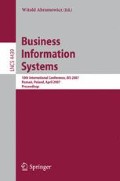Abstract
This paper presents a real case study of warehouse replenishment process optimization on a selected sample of representative materials. Optimization is performed with simulation model supported by inventory control algorithms. The adaptive fuzzy inventory control algorithm based on fuzzy stock-outs, highest stock level and total cost is introduced. The algorithm is tested and compared to the simulation results of the actual warehouse process and classic inventory control algorithms such as Least-unit cost, Part period balancing and Silver-Meal algorithm. The algorithms are tested on historic data and assessed using the Fuzzy Strategy Assessor (FSA). Simulation results are presented and advantages of fuzzy inventory control algorithm are discussed.
Access this chapter
Tax calculation will be finalised at checkout
Purchases are for personal use only
Preview
Unable to display preview. Download preview PDF.
References
Silver, E.A., Pyke, D.F., Peterson, R.: Inventory management and production planning and scheduling. Wiley, Chichester (1998)
Tompkins, A.J., Smith, J.D.: The warehouse management handbook. Tompkins Press, Boston (1998)
Kljajić, M., Bernik, I., Škraba, A.: Simulation approach to decision assessment in enterprises. Simulation 74(4), 199–210 (2000)
Minner, S.: Strategic safety stocks in supply chains. Springer, Heidelberg (2000)
Reiner, G., Trcka, M.: Customized supply chain design: Problems and alternatives for a production company in the food industry. A simulation based analysis. International Journal of Production Economics 89(2), 217–229 (2004)
Rotshtein, A.P., Rakityanskaya, A.B.: Inventory control as an identification problem based on fuzzy logic. Cybernetics and Systems Analysis 43(3), 411–419 (2006)
Samanta, B., Al-Araimi, S.A.: Application of an adaptive neuro-fuzzy inference system in inventory control. International Journal of Smart Engineering System Design 5(4), 547–553 (2003)
Shervais, S., Shannon, T.T.: Adaptive critic based adaptation of a fuzzy policy manager for a logistic system. In: Smith, M.H., Gruver, W.A., Hall, L.O. (eds.) Proceedings of IFSA/NAFIPS (2001)
Xiong, G., Koivisto, H.: Research on fuzzy inventory control under supply chain management environment. In: Sloot, P.M.A., et al. (eds.) ICCS 2003. LNCS, vol. 2658, pp. 907–916. Springer, Heidelberg (2003)
Rosen, R.: Anticipatory systems. Pergamon Press, New York (1985)
Ertogral, K., Darwish, M., Ben-Daya, M.: Production and shipment lot sizing in a vendor-buyer supply chain with transportation cost. European Journal of Operational Research 176(3), 1592–1606 (2007)
Kljajić, M., et al.: Warehouse optimization in uncertain environment. In: Proceedings of the 22nd International Conference of the System Dynamics Society, Oxford, England, UK, July 2004, System Dynamics Society (2004)
Zadeh, L.A.: Fuzzy sets. Information and Control 8, 338–353 (1965)
Dey, J.K., Kar, S., Maiti, M.: An interactive method for inventory control with fuzzy lead-time and dynamic demand. European Journal of Operational Research 167, 381–397 (2005)
Katagiri, H., Ishii, H.: Some inventory problems with fuzzy shortage cost. fuzzy sets and systems. Fuzzy Sets and Systems 111(1), 87–97 (2000)
Petrovic, D., Roy, R., Petrovic, R.: Modelling and simulation of a supply chain in an uncertain environment. European Journal of Operational Research 109(1), 200–309 (1998)
Petrovic, D., Roy, R., Petrovic, R.: Supply chain modelling using fuzzy sets. International Journal of Production Economics 59(1-3), 443–453 (1999)
Petrovic, R., Petrovic, D.: Multicriteria ranking of inventory replenishment policies in the presence of uncertainty in customer demand. International Journal of Production Economics 71(1-3), 439–446 (2001)
Author information
Authors and Affiliations
Editor information
Rights and permissions
Copyright information
© 2007 Springer Berlin Heidelberg
About this paper
Cite this paper
Kofjač, D., Kljajić, M., Škraba, A., Rodič, B. (2007). Adaptive Fuzzy Inventory Control Algorithm for Replenishment Process Optimization in an Uncertain Environment. In: Abramowicz, W. (eds) Business Information Systems. BIS 2007. Lecture Notes in Computer Science, vol 4439. Springer, Berlin, Heidelberg. https://doi.org/10.1007/978-3-540-72035-5_42
Download citation
DOI: https://doi.org/10.1007/978-3-540-72035-5_42
Publisher Name: Springer, Berlin, Heidelberg
Print ISBN: 978-3-540-72034-8
Online ISBN: 978-3-540-72035-5
eBook Packages: Computer ScienceComputer Science (R0)

